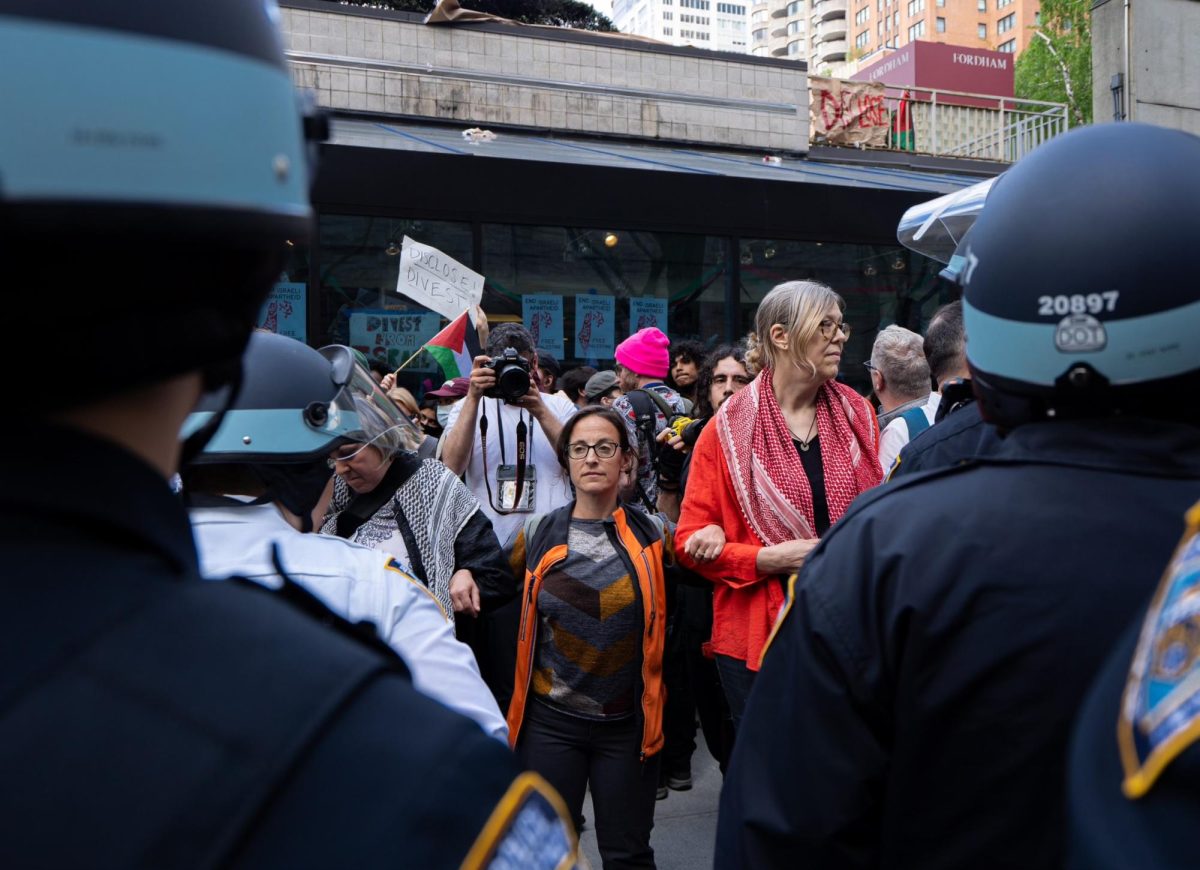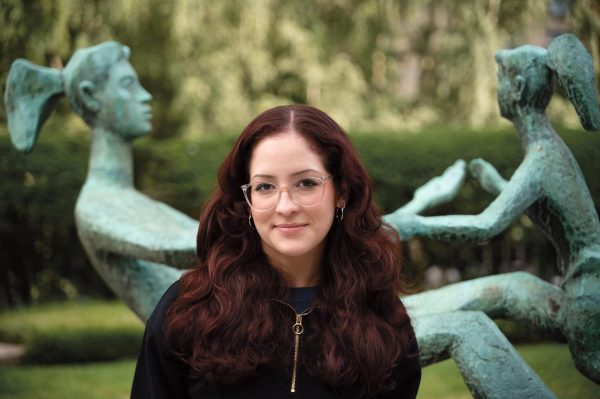Fordham faculty members have come forward in a show of support and solidarity for pro-Palestine student advocates as demonstrations have escalated on university campuses nationwide, drawing large numbers of supporters and intense police responses.
Since Fordham Students for Justice in Palestine (SJP) held a rally that drew hundreds on April 25 and organized a protest-style encampment that led to the arrest of 11 students and 4 alumni on May 1, some professors have issued statements of support for students’ actions, including a letter that called for “Justice in Palestine,” which has been signed by more than 190 faculty.
In a letter sent to The Observer on April 28, Jordan Stein, English professor and director of the Lincoln Center Honors Program, said that in the 12 years he has taught at Fordham, no other semester has been marked with so much despair among students.
“You told me about wellness apps foisted on you in place of human connections, and about TikToks that showed bombs raining down on universities in Gaza while on Instagram Fordham’s leadership posted selfies,” Stein wrote. “You told me that it feels like no one is listening. Some of you looked me in the eye and said your University has failed you, and I saw where you were coming from.”
Dr. Shapoor Vali, an associate professor of economics at Fordham College at Lincoln Center, decried university administrators’ silence on Israel’s actions in Gaza across the country in another letter to The Observer sent on May 5. Vali points to the deaths of Gazan students and educators, as well as the damage and destruction that has beset all twelve universities in Gaza since the war in Gaza began.
“The total silence of our administration in the face of the destruction of all places of worship, including churches, and the killing of innocent people, including many Christians who had taken refuge in them, is doubly shameful,” Vali wrote.
Vali is one of 190 faculty members at Fordham who have signed a statement of support for “Justice in Palestine” since April 25. The letter declares solidarity with student protestors and calls for the university to protect free speech.
Despite the university’s decision to request that the NYPD arrest students and alum in the encampment and issue suspensions, pro-Palestinian students have continued to speak out.
“We believe that fostering free inquiry and maintaining the right to peaceful protest and safety for all students are not opposing values but rather co-constitutive and necessary functions of a university,” the statement reads. The letter gathered dozens of more signatures following the arrest and suspension of the 11 students who participated in the encampment.
Despite the university’s decision to request that the NYPD arrest students and alum in the encampment and issue suspensions, pro-Palestinian students have continued to speak out. On May 3, SJP organized a rally outside of the Rose Hill campus to continue to demand that the university reinstate Fordham SJP as an official club, condemn Israel’s military campaign in Gaza as a genocide, and disclose and divest all of its funds tied to Israel’s military.
In a letter shared in an Instagram story post by Fordham SJP on May 4, Mark Naison, professor of African American studies and history, likened the commitment of student protestors at Fordham to that of those that played critical roles in the passage of the Civil Rights Acts of 1964.
“Please know that many of your professors support what you are doing and will do what we can to reverse your suspensions. And future generations of Fordham students will honor your sacrifice, and build upon your example.” Mark Naison, professor of African American studies and history
Naison also refers to the Fordham students from the Society of Afro-American Advancement at Fordham and Student Faculty Coalition for a Restructured University, who organized a slew of protests and demonstrations from 1968 to 1969. Among them were actions such as sit-ins organized in Cuniffe House. Students’ demands included the termination of an R.O.T.C. army recruiting program on campus and the creation of an “institute of black studies” at Fordham.
“Please know that many of your professors support what you are doing and will do what we can to reverse your suspensions,” Naison wrote. “And future generations of Fordham students will honor your sacrifice, and build upon your example.”
Fordham SJP later posted a video message from Naison on May 5, urging students to continue “speaking up, and speaking out.”
“I am so proud of all of you, thank you,” Naison said, who also partook in protests at Columbia University in 1968 to oppose the construction of a segregated gym and U.S. involvement in the Vietnam War.
According to sources familiar with the matter, suspension hearings for the 11 students involved in the encampment last Wednesday were scheduled to be held on May 3 but have been postponed.
“Praying, whether calmly or fervently, for peace by a university administrator who has part of its endowment portfolio invested in stocks or bonds of weapon manufacturers or companies whose products facilitate mass killing and destruction is as hypocritical as ‘they are in my thoughts and prayers’ by gun lobbyists.” Dr. Shapoor Vali, associate professor of economics
In her email addressing the Fordham community following the removal of the encampment protest, University President Tania Tetlow condemned the protestors and emphasized that the university would increase security across campuses, wishing “fervent prayers for peace.”
Vali likens Tetlow’s words to the attitudes of U.S. congressional members in the aftermath of mass shootings. While the United States leads the world in mass shooting incidents, it has yet to pass comprehensive gun control.
“Praying, whether calmly or fervently, for peace by a university administrator who has part of its endowment portfolio invested in stocks or bonds of weapon manufacturers or companies whose products facilitate mass killing and destruction is as hypocritical as ‘they are in my thoughts and prayers’ by gun lobbyists,” he said.
Several other groups have also come forward to pledge their support. A letter of solidarity organized by Fordham Alumni for a Free Palestine, has gathered over 1000 signatures according to Rae Angelo Tutera, Fordham College at Rose Hill ’07. The newly-created collective was organized in response to students’ advocacy.
Numerous other student groups have expressed support via Instagram, including the Black Student Alliance at Lincoln Center, Immigration Advocacy Coalition and the Fordham Graduate Student Workers.
“Please, keep speaking your truth,” Stein said in his April 28 letter. “Because I assure you the people who appear to be ignoring you are listening.”
CORRECTION: A previous version of this article incorrectly spelt Rae Angelo Tutera’s last name as “Tutero”. The article has been updated to reflect the correct spelling.


